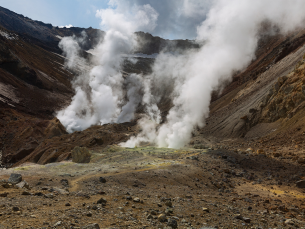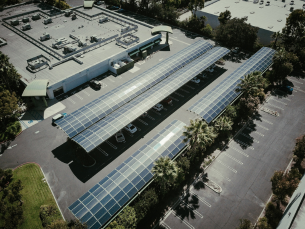Concept/Mission:
Human activities and their development cannot leave aside the direct or indirect and efficient use of energy. The energy sources that, to date, we can use, with the only exceptions represented by geothermal and nuclear energy, originate from the sun (solar, wind, biomass and fossil fuels, etc.). It is important to underline that geothermal energy is available 24 hours on 24 hours respect to other renewable sources. Geothermal energy was and is utilised for a lot of applications in human life. In the past time its most common use was for health and thermal baths. Today we have the possibility to exploit it for numerous applications: from the production of electric energy to the air conditioning (geothermal heat pumps and district conditioning for heating, but also for cooling, the buildings) and others (see below) in relationship to the enthalpy of the resource. For finding and analysing the eventual geothermal resource at depth (e.g. geothermal fluids in a reservoir, heat of the surrounding rocks), the researches pass through different stages including geological, hydro-geological, geochemical, geophysical studies that allow the location of a drilling. In the case of positive results, the modelling of the geothermal system and its exploitation (e.g. building of geo-thermoelectric power plants) take place. The monitoring of the environmental impact during the drilling and exploitation of the resource is needed to avoid possible pollution risks that today can be reduced to zero through appropriate technologies. Finally, a lot of geothermal applications are today possible also for fluids below 90°C (e.g. food processing, breeding, aquaculture, desalination of marine water) or for recovering/storing the heat directly from/in the rocks of the underground through appropriate exchangers (e.g. geothermal heat pumps).
The course is designed to provide postgraduate professionals with specific qualification for operational management in Renewable Resources related to Geothermic. The course will give skills for exploitation of geothermal energy of any enthalpy for numerous uses of human life.
Duration: 12 Months:
As every Professional Master’s programme, the Course lasts 1.500 hours/year; of
which:
• 300-400 dealing with lessons and seminars
• 250 individual study
• 350-400 stage/internship/applied research
• 400 thesis and exams
• Residual: Seminars
Academic Credits : 60 academic credits
Stage and Didactic Programme:
In the start-up phase of the Course, educational offers aimed at the needs of each student and group work will be studied and prepared. Thus, it will be possible to start a tailored programme on an individual level, but more often working groups will be created which will carry out collective activities coordinated by teachers and tutors.
The individual work, the stage, mainly as an internship (applied research or field experience) and the thesis work will also be scheduled in line with the prearranged schedule.
Admission Requirements:
Candidates with an adequate level of English language knowledge may participate in the Master’s programme if they are holders of any first degree or similar qualification. In most cases, the Bachelor’s degree is an academic title which allows access to this Master, post-graduate students willing to engage in aforesaid activities are welcome to apply.
A detailed CV/Resume is also required.
Career Progression:
The need for interdisciplinary geoscientists and experts who can oversee and apply interdisciplinary relationships and decision-making processes in the exploration, economic development and sustainable use of geo-energy resources is increasing.
The course aims to train current and future personnel of International Organizations, Energy Agencies; specialised experts and professionals involved in Renewable Energies activities.
Course Features
- Lectures 0
- Quizzes 0
- Duration 2023 / 2024
- Skill level Beginner
- Language English
- Students 0
- Assessments Yes






